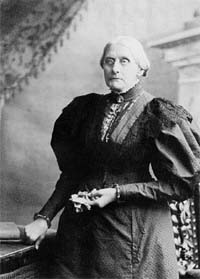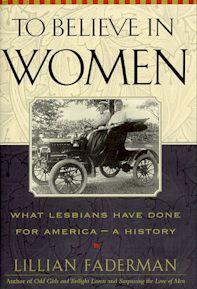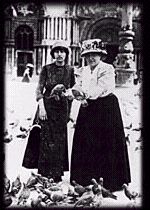 |


|
|
By Bob Minor Minor Details
It took "radical" and "disruptive" people willing to give blood, sweat, and tears to change that so freedom would be something legal regardless of gender, race, or skin color. We white males, even if we are gay, hate to admit that we have historical privileges others haven't. Change came about often because women, often people who today would identify as lesbians, forced that change upon us against the odds. There were many courageous men too, but the Americans who most often identified the need for change were not privileged, white males. A careful look at U.S. history reminds us of the place of our sisters, our lesbian sisters, in the struggle for freedom. Nineteenth-century women who formed domestic partnerships with other women were more likely to be pioneers for broadening liberty. They often began as abolitionists. Their struggles would turn to women's suffrage as a result of their experiences advocating for the end of slavery. Extending the vote to men of color was only a step, not enough, but in this too they participated fully and led in both movements. The most well-known sister was Susan B. Anthony, who began her public career as a lecturer for the American Anti-Slavery Society. In 1869, after forming a close relationship with Elizabeth Cady Stanton, they both called the first post-Civil War women's suffrage convention which formed the National Woman Suffrage Association. The ultimate result was the extension of voting rights to women. Seldom, however, are women such as Anthony recognized for their affection for other women. Our culture prefers "straightening up" our heroes and heroines. Her most well-known beloved was Emily Gross of Chicago, a married woman. As Anthony wrote in a letter to a niece, "I shall go to Chicago and visit my new lover -- dear Mrs. [Emily] Gross -- en route to Kansas . . . ."
The facts are that we owe the extension of our freedoms to the work of our sisters, and our lesbian sisters. And we gay, white males do not know the greater strength it took for these women to overcome the layers of prejudice they faced. We too have known discrimination, been threatened, hurt, killed, ridiculed, and rejected for being gay. We know what it takes to face that. But we have little idea of what it means for a woman who is also a lesbian to stand up against both the heterosexism and sexism of our culture, and of us, to lead movements for liberation. We are good at denial of the depth of women's issues. We forget what it must have been like for girls to hear the same early taunts we heard as boys about how bad it was to be, look, or act "like a girl." We know little of what it meant to be told your value and being is so inferior that you need the approval of the gender you are not to be valuable. We have no idea what it means not only to be told how inferior a woman is but to suspect you don't even fit this definition of an inferior gender because you love other women. We don't realize the depth of being told to "bite your tongue" and never let the anger out that bottles up inside our sisters.
And the final thing they have done for us is called "feminism." We men are not supposed to like "feminism." We are supposed to put it down, criticize feminists as some evil, anti-male force. That's what the system is teaching us. But those who have argued for equal rights for women (a definition of "feminism") have done us a favor, because, if we are listening closely, we will see that they have led again in extending freedom for all of us.
We owe our sisters for that insight as well. They are leaders in the next extension of equality in the U.S. The least we can do is make sure we aren't a part of putting our sisters down.  Robert N. Minor, Ph.D. is the author of Scared Straight: Why It's So Hard
to Accept Gay People and Why It's So Hard to Be Human (HumanityWorks!,
2001) and Professor of Religious Studies at the University of Kansas. He
was a member of the Values Panel for the Kansas City Star's nationally
award winning "Raising Kansas City Project" which was concerned with the
values we teach the next generation. He may be reached at Minor@libertypress.net.
Robert N. Minor, Ph.D. is the author of Scared Straight: Why It's So Hard
to Accept Gay People and Why It's So Hard to Be Human (HumanityWorks!,
2001) and Professor of Religious Studies at the University of Kansas. He
was a member of the Values Panel for the Kansas City Star's nationally
award winning "Raising Kansas City Project" which was concerned with the
values we teach the next generation. He may be reached at Minor@libertypress.net.
|

© 1997-2002 BEI
 The Mother of Women's Rights: Susan B. Anthony
The Mother of Women's Rights: Susan B. Anthony  Such sentiments are found throughout these movements and are documented
in Lillian Faderman's book To Believe in Women: What Lesbians Have
Done for America -- A History (1999).
Such sentiments are found throughout these movements and are documented
in Lillian Faderman's book To Believe in Women: What Lesbians Have
Done for America -- A History (1999).
 Women's liberation pioneers Gertrude Stein and Alice B. Toklas, 1908
Women's liberation pioneers Gertrude Stein and Alice B. Toklas, 1908